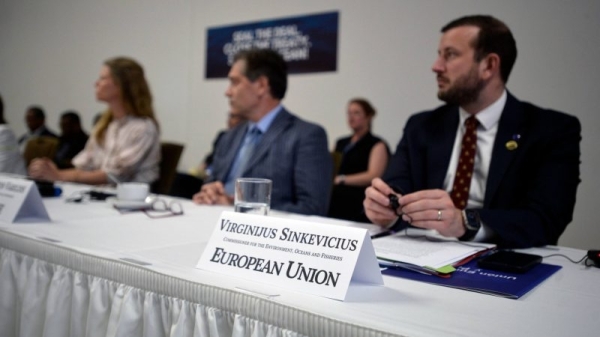US, EU pledge billions at international ocean conference

A global conference to save the world’s oceans kicked off Thursday (2 March) in Panama with urgent calls to adopt an international protection treaty, along with billions of dollars in US and EU pledges for research, monitoring and conservation.
Political and business leaders, environmental activists and academics at the two-day conference are grappling with how best to address a multitude of threats facing the oceans – from climate change and pollution to overfishing and mining.
The Our Ocean Conference is “so incredibly important because it is a conference that is focused on action, not on talk. It’s about real commitments and real solutions,” White House climate envoy John Kerry said at the meeting’s opening.
The former secretary of state announced US commitments of nearly $6 billion across 77 projects to protect the high seas in 2023, including technical cooperation to facilitate “green shipping corridors”.
In a similar spirit, the European Union announced it would dedicate €816.5 million to ocean-related projects this year.
A large slice of the EU money – €320 million euros – will go towards research to protect marine biodiversity and address the impacts of climate change on the seas, while another €250 million will help launch the Sentinel-1C satellite to observe ice melt and monitor climate change effects.
“The ocean is part of who we are, and it is our shared responsibility,” EU environment, oceans and fisheries commissioner Virginijus Sinkevičius said in a statement.
Panama President Laurentino Cortizo on Thursday signed a decree to enlarge the Banco Volcan Marine Protected Area (MPA) from 14,000 to 93,000 square kilometers.
Panama will now conserve more than 54% of the ocean that falls inside its exclusive economic zone, said the country’s environment minister, Milciades Concepcion.

Biodiversity in Europe: EU aims to protect 30% of land and sea
With a UN biodiversity summit approaching in spring, 2021 has been hailed as a super year for biodiversity. As part of its contribution, the European Commission is preparing legislation to introduce legal protection for 30% of land and sea in Europe.
Treaty on the high seas
On the eve of the conference, representatives of the European Union, the United States, Latin America and the Pacific Islands called for a treaty on the high seas, which has been under discussion at the United Nations for more than 15 years, to be signed as soon as possible.
Delegates have been meeting in New York since February 20 to conclude a text in the latest round of talks due to end Friday.
The high seas, which are not under the jurisdiction of any country, represent more than 60% of the oceans and nearly half of the planet.
UN Secretary-General Antonio Guterres called Wednesday for negotiators to conclude a “robust and ambitious” treaty on the high seas.
“Our ocean has been under pressure for decades. We can no longer ignore the ocean emergency,” he said.
Other topics on the Our Ocean agenda include expanding Marine Protected Areas and developing a sustainable ocean-derived “blue economy.”
Covering three-quarters of the Earth, the oceans are home to 80% of all life on the planet, and provide nourishment for more than three billion people.

UN to try anew to finish treaty protecting the high seas
UN member states on Monday (20 February) open two weeks of negotiations aimed at finally reaching a treaty meant to protect and preserve vast areas of the world’s oceans.
Mining, overfishing
Since the first Our Ocean conference in 2014, participating nations have committed more than $108 billion and protected five million square miles of ocean, according to organisers.
Observers say Our Ocean is the only conference to address all ocean-related issues under one roof.
It also serves as a public stage for governments to show their political will.
Conference delegates do not adopt agreements but rather announce voluntary “commitments” to ocean protection.
The meeting occurs as multinational companies eye minerals on the ocean floor.
These include so-called manganese nodules, settled on the seabed, that contain metals critical in battery production.
Environmentalists say harvesting them could devastate deep-sea ecosystems.
NGOs are also concerned about overfishing, pushing at the conference for satellites to monitor fishing fleets.
“A third of commercial (maritime) species are over-exploited,” said Monica Espinoza of the NGO Global Fishing Watch.
Governments must “require that their fishing fleets… are traceable full-time by satellite so that we know that they are fishing honestly,” Andrew Sharpless, executive director of the NGO Oceana, told AFP.
Kerry announced that the United States, Panama and Fiji are in talks to create “green shipping corridors.”
These would be reserved for low-carbon or zero-carbon vessels, according to experts, while also combating illegal catches and overfishing.

EU warned about environmental impact of deep seabed mining
Deep seabed mining for minerals used in car batteries and other green technologies should not be permitted in Europe until there is sufficient knowledge on the environmental impact it may cause, said the Portuguese minister of maritime affairs.



